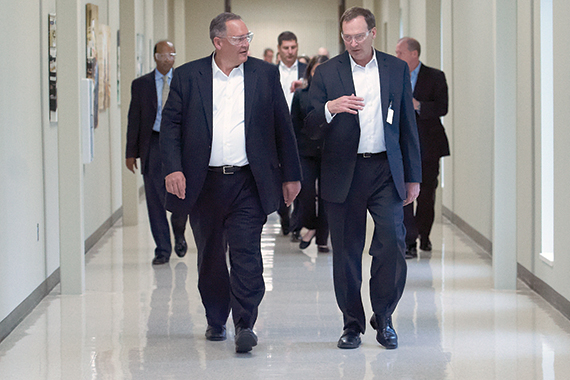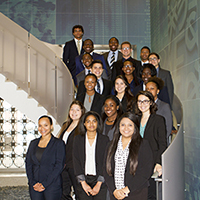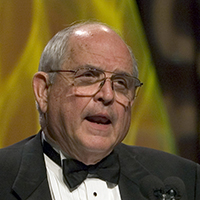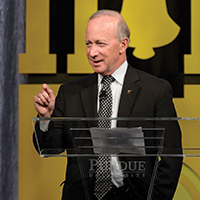 United Technologies Corp. (UTC) president and CEO Gregory Hayes (left) tours the UTAS Sensors & Integrated Systems facility in Burnsville, Minnesota, accompanied by Steve Rausch, general manager, UTAS SIS Air Data, MEMS and Flight Management Systems. The tour was part of a June 2015 visit to the UTC Aerospace Systems business unit. (Photo provided by UTC)
United Technologies Corp. (UTC) president and CEO Gregory Hayes (left) tours the UTAS Sensors & Integrated Systems facility in Burnsville, Minnesota, accompanied by Steve Rausch, general manager, UTAS SIS Air Data, MEMS and Flight Management Systems. The tour was part of a June 2015 visit to the UTC Aerospace Systems business unit. (Photo provided by UTC)
Top Job
Gregory Hayes takes the helm at United Technologies
Among American universities, Purdue ranks in the top 20 for producing Fortune 500 CEOs. Purdue also is among only 12 public universities in 2015 with at least two alumni leading Fortune 100 companies. Both are graduates of the Krannert School.
The top spot among Purdue alumni belongs to Gregory Hayes (BSM ’82), who on Nov. 24, 2015, began his second year as president, CEO and a director of United Technologies Corp. (UTC), which generated $65 billion in revenue in 2014 and placed 45th on the Fortune list for 2015. The second top-100 alum is Sam Allen (BSIM ’75), president, chairman and CEO of Deere & Co., which is 86th on the 2015 list.
Hayes, a 25-year veteran of Connecticut-based UTC, previously served as the company’s senior vice president and chief financial officer, with responsibilities that included directing communications and interactions between UTC’s board of directors and the investor community.
Despite a demanding work schedule and his vast responsibilities as CEO of one of the world’s largest corporations, Hayes found time this summer for a Q&A with Krannert Magazine about his time at Purdue, his role as CEO, and how corporations and higher education can work together to produce more highly skilled workers, innovate new technologies and stimulate global growth.
Krannert Magazine: What brought you to Purdue and the Krannert School?
Greg Hayes: I came out of high school thinking I wanted to be an attorney and spent a year in pre-law at Cornell University, which soon convinced me I didn’t want to be a lawyer after all. As I considered other opportunities, I realized the Krannert School, with its broad academic offerings in industrial management and economics, would give me the background for a successful business career.
KM: What elements of your college experience have been most impactful in your career and life?
GH: Purdue is a big school and it can be a little intimidating at first. But what I found at the Krannert School was a small-town feeling within a large university. It really helped me assimilate into the Purdue campus.
One of the great things about Purdue is, because of its size, there are lots of opportunities to learn different things. For me, one was a biology class for non-science majors with a professor who let me serve as a teaching assistant in my junior year. While at Purdue, I also earned a minor in history and I still enjoy the subject to this day. It’s an amazing place where you can be an economics major while also expanding your horizons beyond business.
Another important experience I had at Purdue was working as a teaching assistant for an introductory economics course. That taught me a lot about how to lead groups and how to provide feedback to groups. It gave me the confidence to stand in front of a large group and teach. Those are invaluable skills for a career in business.
KM: What are your memories of Purdue outside of the classroom?
GH: My favorite memories of Purdue are those beautiful Friday afternoons in the spring before classes are out for the summer and having something cold to drink at Harry’s Chocolate Shop. I trust many of my fellow Purdue alumni have similar fond memories.
KM: Did your career goals upon graduation include becoming a CPA before leading such a respected global company as UTC?
GH: When I graduated from Purdue in May 1982, the national unemployment rate was about 12 percent. So my first goal was simply finding a job.
Having majored in economics with a minor in history, my options were pretty limited. Eventually, the San Francisco office of Arthur Andersen offered me a job in their accounting and auditing group on the condition that I take intermediate accounting so I could sit for the CPA exam. Careers are often more about happenstance and opportunity than anything. Coming out of Purdue, I certainly didn’t plan to become an accountant, let alone a CPA. Even so, I wound up working in public accounting for almost eight years before I left the profession.
I have been fortunate to be presented with a lot of opportunities that allowed me to develop my skill set. I moved seven times in my first 10 years with Sundstrand Corp., which was later acquired by UTC. That certainly provided me with many new and challenging career opportunities.
Becoming CFO of a major corporation was always my goal once I left public accounting. The fact that I went from being the CFO to the CEO was happenstance, but it was also an opportunity. You have to be prepared for that. Always be prepared for the next opportunity.








